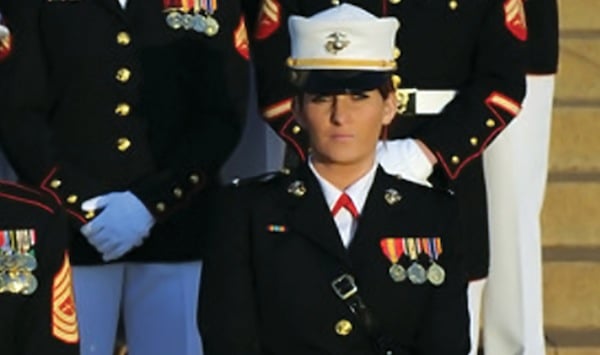The Invisible War: Rape in the Military
October 29, 2012
 Ariana Klay claimed she was raped by a senior officer and her civilian boss.
Ariana Klay claimed she was raped by a senior officer and her civilian boss.
“He hit me across the left side of my face … and my face hurt so bad. He screamed at me and he grabbed my arm and he raped me.” Kori Cioca’s heartbreaking account of her rape by a commanding officer while serving in the US Coast Guard is not the most shocking part of her testimony. Following the attack, Cioca was told by her superiors that if she went forward with her case she would be court-martialed for lying; her assailant, who admitted the attack but denied rape, then received just 30 days of base restriction and loss of pay and the US Department of Defense continues to refuse to pay for the surgery she needs for the nerve damage to her face.
Cioca is just one of the women interviewed in The Invisible War, a feature-length documentary that lifts the lid on the abuse of women in the US military and which got its first UK screening in the Frontline Club in London last week.
The film has raised similar concerns this side of the Atlantic that rape is a hidden scourge in the military. According to figures released to Labour MP Madeleine Moon, a rape or sexual assault is reported by a member of the armed forces every week. Over the past two and a half years, there have been 53 reported rapes and 86 reported sexual assaults in the army, the navy and the air force, but Moon believes the figure is an underestimation and could be as many as an attack a day.
Between 2001-2011, Ministry of Defence figures show 56 members of the armed forces were court-martialed for sexual offences – of these, just 16 resulted in a conviction.
UK screenings of The Invisible War are in the pipeline, as is its release on iTunes in the UK, while its makers are urging UK viewers to host their own screenings.
Lifting the lid on the extent of the abuse is vital to tackling the problem of rape in the military, says Amy Ziering, producer of the film, which was directed and written by Kirby Dick. “There is a perfect storm of conditions to keep this secret,” she says, speaking from Los Angeles. “There is no incentive to report rape, it is not treated as a priority in the military and the nature of the crime means that it is so implosively devastating that many women get the blame, or blame themselves.”
The statistics revealed in The Invisible War, which won the audience award at this year’s Sundance film festival, make shocking reading: a female soldier in combat zones is more likely to be raped by a fellow soldier than killed by enemy fire, over 20% of female veterans have been sexually assaulted while serving in the US army, of 3,192 sexual-assault reports in 2011 only 191 members of the military were convicted at courts martial.
Rape within the military has been exposed before – the Tailhook Association meetings in 1991, the Aberdeen Proving Ground in 1996 and the Air Force Academy in 2003 – but it has rarely been done with such a devastating combination of first-person testimony, watertight research and high-level interviews.
Through the testimony of victims and their families the extent of that devastation is laid bare, as well as the failings of a system that sees a rape victim’s commander decide whether to take action after a rape report.
Click here to read more.

